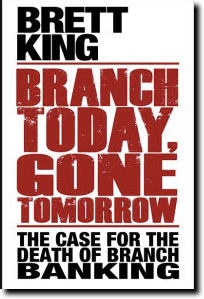
As usual, I’ve been listening to my favorite podcasts (Finovate of course, go Greg!, Breaking Banks, Jim Marous, 11:FS, and Bank On It to name a few) and there has been much talk about the covid crisis and what it means for digital banking and the fintech challengers.
Clearly, this is the digital tipping point we’ve been waiting for since the late 1990s (see previous post). But I have a slightly different take on who benefits from the upheaval. Sure, consumers and small business owners have been frustrated at legacy banks by long call hold times, bungled communications, lack of transparency on PPP loan applications, etc. And there are more frustrations to come (PPP debt forgiveness for one).
But even with all that, do you think consumers are blaming the problems on their bank? No, it’s a FREAKING pandemic; of course it’s hard to get through to your bank struggling with homebound workers, massive call volumes, spiking loan delinquencies, not to mention all the health and economic worries.
I do not think this mess drives consumers and SMBs to seek out banking alternatives. Just the opposite. When fear rules, the last thing you want to do is make changes in your financial providers. In fact, as we saw in the financial crisis (which rightly you COULD blame on banks), there will be a flight to safety with the legacy companies increasing market share. As a data point, in the 10 years following the financial crisis, the big-3 U.S. banks increased their share from 20% to 32%, a 60% rise in market share!
 The poster child for this change is Moven, the challenger bank Brett King founded in 2011. The startup was originally all-in on DTC, but in 2014 pivoted a white-label provider to large banks (first with TD Bank). However, they continued the DTC option until last month when they threw in the towel on DTC and went all-in on selling through banks. A complete 180 for the startup, and founder, that made their name throwing shade on legacy banks and payment methods.
The poster child for this change is Moven, the challenger bank Brett King founded in 2011. The startup was originally all-in on DTC, but in 2014 pivoted a white-label provider to large banks (first with TD Bank). However, they continued the DTC option until last month when they threw in the towel on DTC and went all-in on selling through banks. A complete 180 for the startup, and founder, that made their name throwing shade on legacy banks and payment methods.
My view
It’s a crappy time for everyone. But the short-term (and maybe mid-term) outlook for challengers is worse due to the current crisis. Most likely, the big legacy players get bigger. Why? Consumers are naturally going to gravitate towards brands that survived the Great Depression, two world wars and even previous pandemics. Name recognition and experience getting through a crisis are critical attributes today.
So it’s going to be a rough few years for newcomers in the direct-to-consumer (DTC) fintech space, other than for a few who’ve achieved escape velocity (eg. Chime, Revolut, Robinhood, etc). On the other hand, the future is bright for startups choosing to partner with existing banks, credit unions and wealth managers. Big banks especially will accelerate their efforts to close branches and some of the resulting cost savings will be repurposed into digital spend (and a bunch will go to loan loss reserves).
Note: Image from GoFloats.


